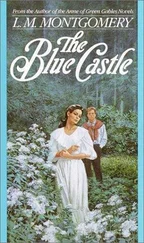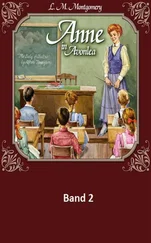"That's the Winthrop coming out in her," said Young Grandmother nastily.
The Lesleys and Blaisdells had more pluck. Marigold never told what had frightened her. She knew they would not believe her. But it was to be years before she could go into the parlour without a shudder, and she would have died rather than sit in that horsehair rocking-chair.
She had never been quite so vindictive over anything as over the affair of the Skinner doll. That had happened last August. May Kemp's mother had come up to clean the apple-barn, and May had come with her. May and Marigold had played happily for awhile in the playhouse in the square of currant-bushes - a beautiful playhouse in that you could sit in it and eat ruby-hued fruit off your own walls - and then May had said she would give one of her eyes to see the famous Skinner doll. Marigold had gone bravely into the orchard room to ask Old Grandmother if May might come in and see it. She found Old Grandmother asleep - really asleep, not pretending as she sometimes did. Marigold was turning away when her eyes fell on Alicia. Somehow Alicia looked so lovely and appealing - as if she were ASKING for a little fun. Impulsively Marigold ran to the glass case, opened the door and took Alicia out. She even slipped the shoe out of the hand that had held it for years, and put it on the waiting foot.
"Ain't you the bold one?" said May admiringly, when Marigold appeared among the red currants with Alicia in her arms.
But Marigold did not feel so bold when Salome, terrible and regal in her new plum-coloured drugget and starched white apron, had appeared before them and haled her into Old Grandmother's room.
"I should have known she was too quiet," said Salome. "There was the two of 'em - with HER on a chair for a throne, offering HER red currants on lettuce leaves and kissing HER hands. And a crown of flowers on HER head. And both HER boots on. You could 'a' knocked me down with a feather. HER, that's never been out o' that glass case since I came to Cloud o' Spruce."
"Why did you do such a naughty thing?" said Old Grandmother snappily.
"She - she wanted to be loved so much," sobbed Marigold. "Nobody has loved her for so long."
"You might wait till I'm dead before meddling with her. She will be yours then to 'love' all you want to."
"But you will live forever," cried Marigold. "Lazarre says so. And I didn't hurt her one bit."
"You might have broken her to fragments."
"Oh, no, no, I couldn't hurt her by loving her."
"I'm not so sure of that," muttered Old Grandmother, who was constantly saying things Marigold was to understand twenty years later.
But Old Grandmother was very angry, and she decreed that Marigold was to have her meals alone in the kitchen for three days. Marigold resented this bitterly. There seemed to be something especially degrading about it. This was one of the times when it was just as well God had arranged it so that nobody knew what you thought.
That night when Marigold went to bed she was determined she would not say all her prayers. Not the part about blessing Old Grandmother. "Bless Mother and Young Grandmother and Salome." Marigold got up then and got into bed, having carefully placed her two shoes close together under the bed so that they wouldn't be lonesome. She did that every night. She couldn't have slept a wink if those shoes had been far apart, missing each other all night.
But she couldn't sleep to-night. In vain she tried to. In vain she counted sheep jumping over a wall. They WOULDN'T jump. They turned back at the wall and made faces at her - a bad girl who wouldn't pray for her old grandmother. Marigold stubbornly fought her Lesley conscience for an hour; then she got out of bed, knelt down and said, "Please bless Mother and Young Grandmother and Salome and everybody who needs a blessing."
Surely that took in Old Grandmother. Surely she could go to sleep now. But just as surely she couldn't. This time she surrendered after half an hour's fight. "Please bless Mother and Young Grandmother and Salome - and you can bless Old Grandmother if you like."
There now. She wouldn't yield another inch.
Fifteen minutes later Marigold was out of bed again.
"Please bless Mother and Young Grandmother and Salome and Old Grandmother for Jesus' sake, amen."
The sheep jumped now. Faster and faster and faster - they were like a long flowing white stream - Marigold was asleep.
The stars were coming out. Marigold loved to watch them - though the first time she had seen stars to realise them she had been terribly frightened. She had wakened up as Mother stepped out of Uncle Klon's car when he had brought them home from a visit in South Harmony. She had looked up through the darkness and shrieked.
"Oh, Mother, the sky has burned up and nothing but the sparks are left."
How they had all laughed and how ashamed she had been. But now Uncle Klon had taught her things about them and she knew the names of Betelguese and Rigel, Saiph and Alnita better than she could pronounce them. Oh, spring was a lovely time, when the harbour was a quivering, shimmering reach of blue and the orchard was sprinkled with violets and the nights were like a web of starlight.
But all the seasons were lovely. Summer, when strawberries were red on the hill-field and the rain was so sweet in the wild rose cups, and the faint sweetness of new-mown hay was everywhere, and the full moon made such pretty dapples under the orchard trees, and the great fields of daisies across the harbour were white as snow.
Of all the seasons Marigold loved autumn best. Then the Gaffer Wind of her favourite fairy-tale blew his trumpet over the harbour and the glossy black crows sat in rows on the fences, and the yellow leaves began to fall from the aspens at the green gate, and there was the silk of frost on the orchard grass in the mornings. In the evenings there was a nice reek of burning leaves from Lazarre's bonfires and the ploughed fields on the hill gleamed redly against the dark spruces. And some night you went to bed in a drab dull world and wakened up to see a white miraculous one. Winter had touched it in the darkness and transformed it.
Marigold loved winter, too, with the mysterious silence of its moonlit snow-fields and the spell of its stormy skies. And the big black cats creeping mysteriously through the twilit glades where the shadows of the trees were lovelier than the trees themselves, while the haystacks in Mr. Donkin's yard looked like a group of humpy old men with white hair. The pasture-fields which had been green and gold in June were cold and white, with ghost-flowers sticking up above the snow. Marigold always felt so sorry for those dead flowerstalks. She wanted to whisper to them, "Spring will come."
The winter mornings were int'resting because they had breakfast by candlelight. The winter evenings were dear when the wind howled outside, determined to get into Cloud of Spruce. It clawed at the doors - shrieked at the windows - gave Marigold delicious little thrills. But it never got in. It was so nice to sit in the warm bright room with the cats toasting their furry flanks before the fire and the pleasant purr of Salome's spinning-wheel in the kitchen. And then to bed in the little room off Mother's, with sweet, sleepy kisses, to snuggle down in soft, creamy blankets and hear the storm outside. Yes, the world WAS a lovely place to be alive in, even if the devil did occasionally carry off people who swore.
CHAPTER IV
Marigold Goes A-visiting
Marigold, for the first time in her small life, was going on what she called a "real" visit. That is, she was going to Uncle Paul's to stay all night, without Mother or Young Grandmother. In this fact its "realness" consisted for Marigold. Visiting with Grandmother was int'resting and visiting with Mother int'resting AND pleasant, but to go somewhere on your own like this made you feel old and adventurous.
Читать дальше


